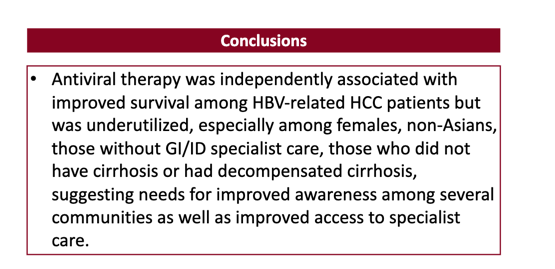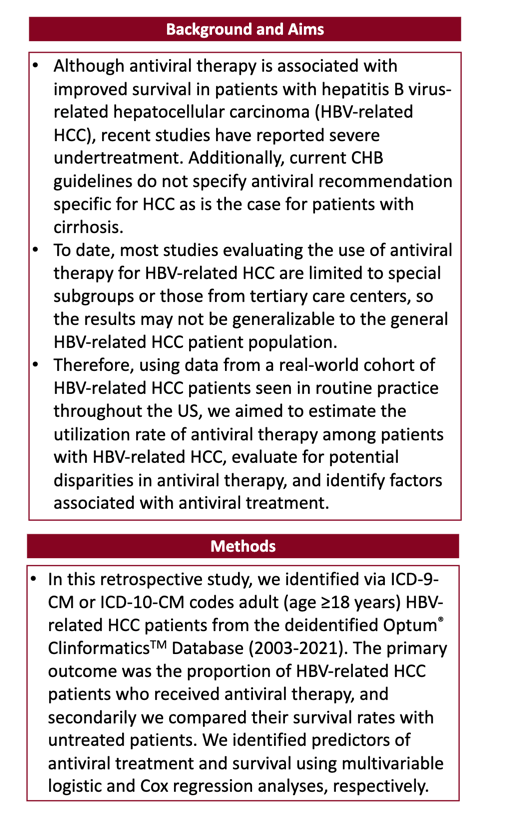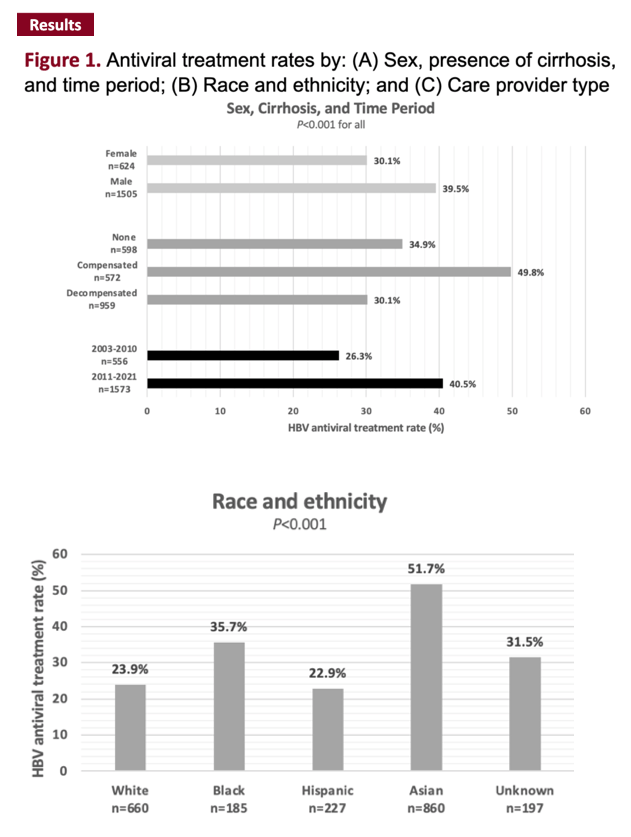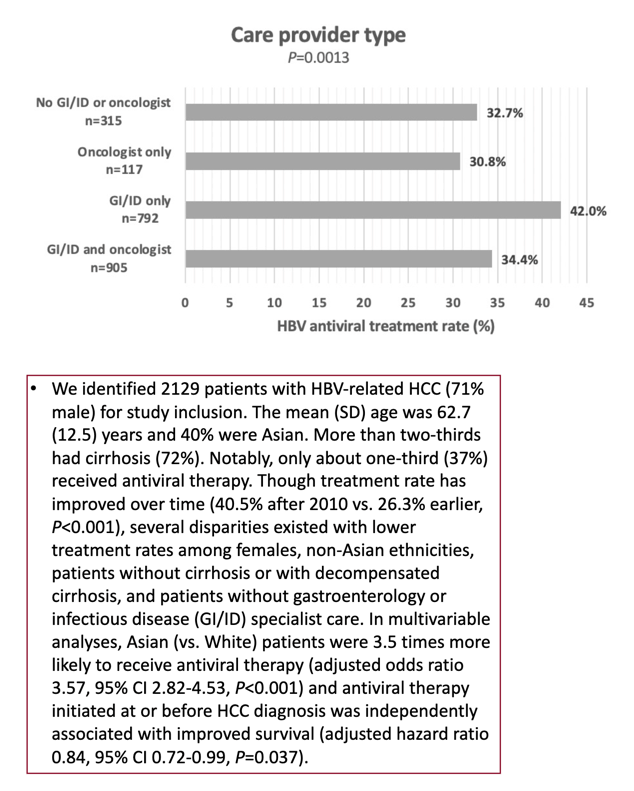 |
 |
 |
| |
Anti-HBV Therapy at or Before HCC Diagnosis
Improves Survival, only 37% received therapy
|
| |
| |
AASLD-The Liver Meeting, November 4-8, 2022, Washington, DC
Mark Mascolini
Getting antiviral therapy for hepatitis B virus (HBV) infection at or before HBV-related hepatocellular carcinoma (HCC) diagnosis was independently linked to improved survival among people in a nationwide US insurance and prescription claims database [1]. Women, non-Asians, people without specialist care, and a few other groups proved less likely to get anti-HBV therapy.
Research ties anti-HBV therapy to better survival with HBV-related HCC, but Stanford University investigators who conducted this study noted that much of this work is limited to patient subgroups or to people treated in tertiary-care centers. No one knows if results of these focused studies apply to the general population with HCC. Furthermore, the Stanford team observed, current chronic HBV guidelines do not make specific antiviral recommendations for HCC.
To get a wider view of antiviral access and impact in people with HBV-related HCC, the Stanford researchers gathered data on a real-world cohort of people with HCC seen in routine practice across the United States. These retrospective numbers came from the Optum Clinformatics Database of eligibility, medical claims, and prescription claims data for the years 2003-2021 [2]. The researchers aimed to estimate how often and when people with HBV-related HCC took antivirals, to search for disparities in anti-HBV medication use, and to determine antivirals' impact on survival.
The investigators used ICD-9-CM or ICD-10-CM codes to find people 18 or older with HBV-related HCC, to determine how many got anti-HBV antiviral therapy, to compare survival of antiviral-treated and -untreated people, and to identify (1) predictors of antiviral treatment with multivariable logistic regression and (2) predictors of HCC survival with Cox regression analysis.
The Stanford team examined records of 2129 people with HBV-related HCC. The group's age averaged 62.7 years, 71% were men, and 40% were Asian. Although 72% of the group had cirrhosis, only 37% took anti-HBV drugs. The treatment rate had improved to 40.5% after 2010 from 26.3% earlier, but several groups had lower overall treatment rates:
• Women
• Non-Asian races/ethnicities
• People without cirrhosis
• People with decompensated cirrhosis
• People not treated by a gastroenterologist (GI) or infectious disease (ID) specialist
Antiviral treatment rates differed significantly (P < 0.001 for all differences) between women and men (30.1% vs 39.5%), between people with decompensated cirrhosis or no cirrhosis versus those with compensated cirrhosis (30.1% vs 34.9% vs 49.8%), and between people who received care in 2003-2010 vs 2011-2021 (26.3% vs 40.5%).
By race or ethnicity, Asians had the highest proportion treated with antivirals (51.7%), followed distantly by blacks (35.7%), whites (23.9%), and Hispanics (22.9%) (P < 0.001). By provider type, those treated by GI or ID providers only were the most likely to get antivirals (42.0%), followed by those treated by GI or ID providers and oncologists (34.4%), those not treated by a GI or ID provider or an oncologist (32.7%), and those treated only by an oncologist (30.8%) (P = 0.0013).
Multivariable logistic regression determined that Asians were about 3.5-fold more likely than whites to get anti-HBV antivirals (adjusted odds ratio 3.57, 95% confidence interval 2.82 to 4.53, P < 0.001). Starting antivirals before or at the time of HCC diagnosis rather than after diagnosis was associated with about 15% improved survival (adjusted hazard ratio 0.84, 95% confidence interval 0.72 to 0.99, P = 0.037).
Improved survival with antivirals started at or before HCC diagnosis-coupled with the many disparities among those treated-underlines the need to improve awareness of antiviral benefits in all communities and to improve access to specialists.
References
1. Kudaravalli S, Kam LY, Huang DQ, Cheung R, Nguyen MH. Utilization of antiviral therapy and its impact on survival rates in patients with chronic hepatitis B virus-related hepatocellular carcinoma (HBV-HCC) in the United States. AASLD-The Liver Meeting, November 4-8, 2022, Washington, DC. Abstract 1161.
2. Optum. Clinformatics for Managed Markets.
https://www.optum.com/business/life-sciences/commercial-analytics/managed-markets.html




|
| |
|
 |
 |
|
|